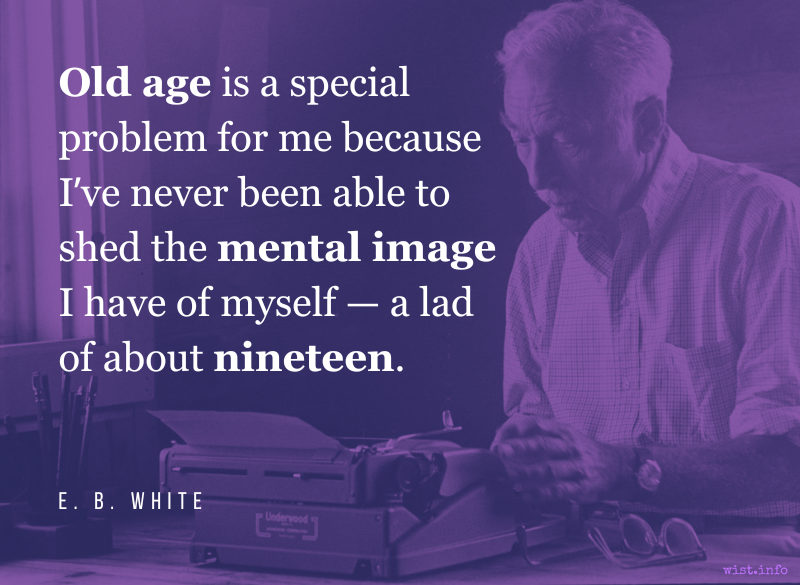Old age is a special problem for me because I’ve never been able to shed the mental image I have of myself — a lad of about nineteen.
E. B. White (1899-1985) American author, critic, humorist [Elwyn Brooks White]
“E. B. White: Notes and Comment by Author,” interview by Israel Shenker, New York Times (1969-07-11)
(Source)
On his 70th birthday.
Quotations about:
self-perception
Note not all quotations have been tagged, so Search may find additional quotes on this topic.
If ever there’s a tomorrow where we’re not together, there is something you must remember. You’re braver than you believe, and stronger than you seem, and smarter than you think.
A. A. Milne (1882-1956) English poet and playwright [Alan Alexander Milne]
(Misattributed)
(Source)
Christopher Robin to Pooh Bear. The quotation is broadly attributed to Milne and Winnie the Pooh, but is actually from the 1997 Disney video Pooh's Grand Adventure: The Search for Christopher Robin, written by Carter Crocker and Karl Geurs, based on the characters created by Milne.
We judge ourselves by what we feel capable of doing, while others judge us by what we have already done.
We are never quite as happy, or as unhappy, as we think.
[On n’est jamais si heureux ni si malheureux qu’on s’imagine.]
François VI, duc de La Rochefoucauld (1613-1680) French epigrammatist, memoirist, noble
Réflexions ou sentences et maximes morales [Reflections; or Sentences and Moral Maxims], ¶49 (1665-1678) [tr. FitzGibbon (1957)]
(Source)
Present in the first edition. In the first four editions, the concluding words were "... que l’on pense [whatever one thinks]." In the manuscript, this maxim read:One is never so unhappy as one fears, nor so happy as one hopes.
[On n’est jamais si malheureux qu’on craint, ni si heureux qu’on espère.]
Another manuscript version is what the Davies translation below derives from:Les biens et les maux sont plus grands dans notre imagination qu’ils ne le sont en effet, et on n’est jamais si heureux ni si malheureux que l’on pense.
Above notes. (Source (French)). Alternate translations:Goods and Evils are much greater in our imaginations of them, than they are in effect; and men are never so happy or unhappy, as they think themselves.
[tr. Davies (1669), ¶128; see above.]None are either so happy or so unhappy, as they imagine.
[pub. Donaldson (1783), ¶211; ed. Lepoittevin-Lacroix (1797), ¶49]No person is either so happy;, or so unhappy, as he imagines.
[ed. Carville (1835), ¶184]We are never so happy, or so unhappy, as we imagine.
[ed. Gowens (1851), ¶50]We are never so happy or so unhappy as we suppose.
[tr. Bund/Friswell (1871); tr. Stevens (1939)]We are never as happy or unhappy as we think.
[tr. Heard (1917)]We are never so happy or so unhappy as we think.
[tr. Kronenberger (1959)]We are never as fortunate or as unfortunate as we suppose.
[tr. Tancock (1959)]We are never so happy nor so unhappy as we imagine.
[tr. Whichello (2016)]







